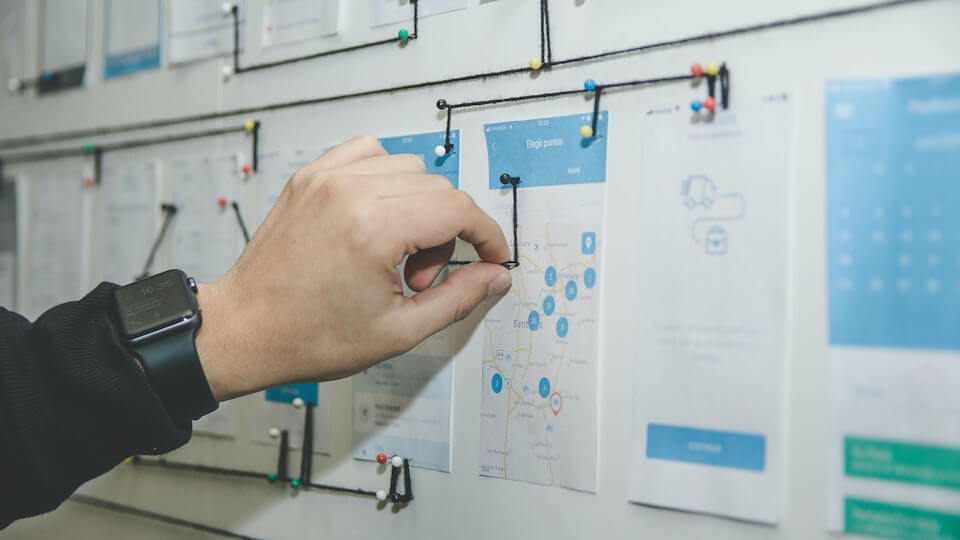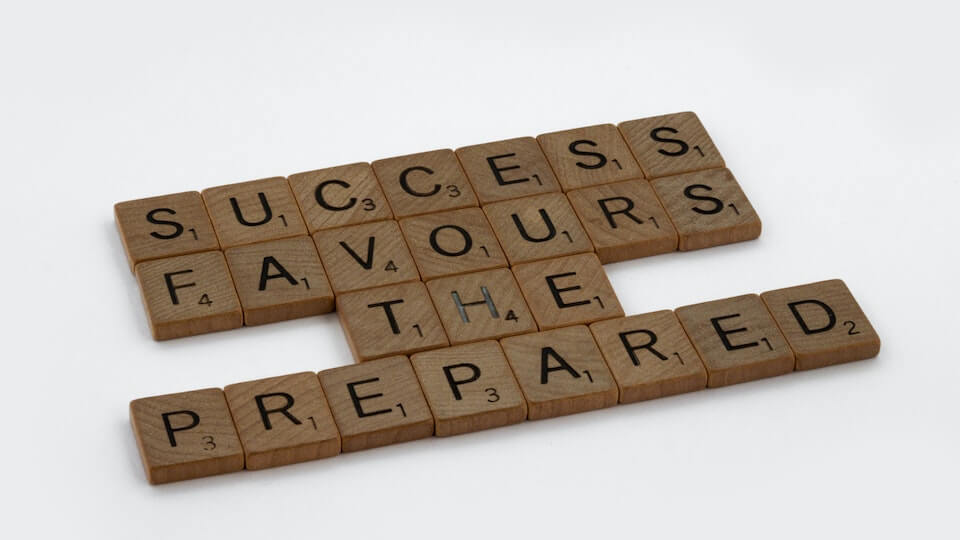
Cybersecurity for Small Business Owners
February 3, 2022
Mapping Your Business’ Process of Selling – Decentralizing
March 1, 2022Prepare for the Next Crisis Using Business Revenue

It’s been said that the Great Depression produced more millionaires than any other time in history. Similarly, the BBC has reported that millions of people became millionaires during the Covid pandemic. But how is it that while so many people were suffering, standing in soup lines, or having their businesses shut down, so many others have found unprecedented prosperity? It all comes down to positioning. In today’s entry, I’m going to share my cash flow philosophy and how you could be using business revenue to prepare for the next crisis.
Follow Along With The Financially Simple Podcast!
TIME INDEX:
- 00:42 – How to Use Your Business’s Revenue to Prepare to Maximize the Next Crisis
- 04:01 – Positioning
- 05:46 – Handling Company Cashflow
- 08:12 – Cover Expenses
- 09:35 – Home Emergency Fund
- 11:27 – Operational Expenses
- 14:48 – Line of Credit
- 16:33 – Receive Retirement Plan Match
- 17:26 – Fully Fund HSA
- 18:17 – Max Out Your ROTH IRA
- 19:04 – Tax Planning
- 20:50 – Non-Qualified Assets
- 23:12 – Summary
- 26:30 – Wrap Up
Positioning: How Some Turn Crisis Into Opportunity
It seems like such a long time ago. In 2019, business was booming. You had plenty of cash flowing through your business and never would have imagined that the world would come to a screeching halt in early 2020. All of a sudden, many business owners were scrambling to make payroll, pay rent, and order product on rapidly decreasing revenues. Had it not been for PPP, EIDL, State Grants, HHS, and many other emergency funding opportunities, millions of businesses would not have survived. Despite this, many business owners (myself included) saw record-breaking revenues. But why?
Well, it comes down to positioning. By positioning your assets for flexibility and in a tax-efficient way, you could build long-term wealth. I’ve worked with many business owners who were properly positioned and therefore, able to make strategic moves to increase their net worth amidst the crisis. So, positioning your assets in a similar manner could actually help you prepare for the next crisis. I know, some of you are saying, “Justin, I don’t know if I can handle another crisis right now.” I completely understand. However, I have a cash flow philosophy that has worked for me and I’ve seen it serve as a solid foundation for many other business owners.
Nine Points: Using Cash Flow to Prepare for the Next Crisis
If you’ve followed me for any amount of time, you know that I love the outdoors. Whether I’m hunting, fishing, or just taking a hike, I love spending time in God’s creation. As such, there are few things in this world that have a more relaxing sound than moving water. Sit me down next to a river or even the ocean, and the sound of the water just carries my stress away. I must not be the only one who feels this way, as I’ve seen Zen Gardens with waterfall features.
In these gardens, the water gently pours into an upper basin until it overflows into the basin below. This continues until the water has filled each of the multi-tiered basins. This is a great way of looking at my nine-point cash flow philosophy. Each step leads into the next step with exponentially larger benefits to you and your business. So, let’s take a look at this approach to find how it could help you prepare for the next crisis.
1. Cover Expenses
The very first thing you must do is ensure that you have enough cash in your personal and business checking accounts to cover one month’s expenses. Therefore, if you spend $10,000 per month on personal expenses such as a mortgage, car payments, etc., you should begin by placing $10,000 in your personal checking account. Similarly, if you’re business operates on $200K each month, you need to have that much in your business account.
You may think this is an excessive amount of cash to keep in your checking accounts. However, I urge you to hear me out. By following these steps, you could reduce your stress level. Knowing your mortgage payment is covered even if you have to refrain from receiving a paycheck for a month enables you to take the calculated risks to improve your business. This is even true in the midst of a crisis.
2. Home Emergency Fund
You must have a properly funded emergency fund at home. What is properly funded? I recommend keeping six months’ worth of personal expenses in a savings or money market account. The Covid pandemic is a perfect example of why you should keep a home emergency fund. I know so many business owners who were forced to tighten their belts when the economy shut down. It’s why I suggest business owners keep a six-month emergency fund. You need to be able to focus on your business during times of crisis. Having six months’ worth of expenses gives you the freedom to do that because you’re not worried about paying your mortgage.
This is something I truly believe in, folks. I’m not just suggesting this to clients, I practice this in my own life. Additionally, I’ve written countless articles on the importance of having a properly funded emergency fund. If you’re interested in learning more about this topic, you can find plenty of information on my website, FinanciallySimple.com.
3. Operational Expenses
Just as with your personal expenses, your business should also have an emergency fund. I generally suggest business owners keep one month’s worth of operating expenses in a savings or money market account. If you’re following the order of these steps, this will give you one month’s expenses in your business checking and another month’s in savings. However, if your business has a sporadic cash flow, you really should keep three to six months’ worth of operating expenses in savings.
If you’re thinking you could invest this cash and see a better return, maybe you’re right. But there’s an old sailing term called “dry powder.” The idea is that you must have a stash of dry gun powder to protect your ship. If it gets wet, you’re basically defenseless. So, think of these funds as your business’s dry powder. The unwillingness of many business owners to keep dry powder is the very reason that so many businesses fell when the crisis came.
4. Line of Credit
Both you and your company must have an available line of credit. This could be anything from a home equity line of credit to a margin account or collateral assignment. Whatever it may be, you must have access to cash beyond your hard assets. You never know what business will do on a month-to-month or even week-to-week basis. Therefore, having access to cash is a welcome safety net. I hope you never need to use it, but if you’re ever in a bind, you know it’s there.
5. Receive Retirement Plan Match
This next step could look a little different based on your individual situation. As always, conduct your own due diligence and speak with a trusted advisor before making any decisions. As a business owner, I want to receive the “free money” of a retirement plan match. Of course, there’s no such thing as free money, but you could take advantage of your company’s retirement plan match. To do so, you must contribute to your retirement plan. If your plan requires a minimum contribution of 5%-6% to receive a match, then you should be contributing at least 5%-6% of your annual salary.
6. Fully Fund Your HSA
The next step is to fully fund your Health Savings Account (HSA). I love the HSA, especially if you’re a generally healthy person. Health Savings Accounts offer a triple benefit. It’s the only account where I can receive a tax deduction for placing money into it while allowing the money to grow tax-deferred and — if I use the money according to the HSA rules — I can take my contributions and earnings out tax-free! So, fully funding your HSA is a game-changer.
7. Max Out Your ROTH IRA
If you’re eligible, the next step is to max out your ROTH IRA. There’s nothing better than tax-free growth! Am I right? As long as you’re utilizing it according to its provisions, the ROTH IRA allows you to grow your money tax-free. Although the backdoor strategy may be on the chopping block with Congress, I love tax-free growth. Therefore, I want to fund my ROTH IRA every year. Speak with your tax and financial advisors to see if you’re eligible for the ROTH contribution. If so, this is an incredible tool that can be leveraged to help prepare for the next crisis.
8. Tax Planning
Now, if you’re receiving your retirement plan’s contribution match, and if you’re eligible to max out your HSA and ROTH IRA, let’s turn our attention to tax planning. Here’s where you want to maximize your tax-deductible accounts. These are things like pensions, profit sharing, or defined benefit plans. The goal is to maximize these accounts as part of an overarching tax plan. But tax planning isn’t something that just takes place around tax season. Instead, it should be taking place throughout the year. That’s why I always suggest working with a razor-sharp tax planning advisor.
When you sit down with your tax planning advisor, you can identify the areas where you can defer your taxable income to greatly reduce it for the present year. This could also create opportunities for deductions that you wouldn’t otherwise be eligible for. I’ve seen people whose businesses make millions of dollars in net operating income, use tax planning to save enormous sums of cash. Through cash balance plans, profit-sharing, and 401(k)s, they can set aside $300K – $500K, reducing their tax brackets and opening themselves up for the Qualified Business Income Deduction (QBID) and many others. Tax planning is a multiplicative movement that could help you build significant wealth.
9. Non-Qualified Assets
Finally, if you still have revenue left over, you want to begin funding non-qualified assets. These could be individual accounts, joint accounts, transfer upon death accounts, or any other type of account that is fully taxable. Each of these steps is intended to build maximum flexibility while reducing taxes and positioning you to deploy all of your resources the next time a catastrophe happens. They could put you in a position to capitalize on opportunities that present themselves (as they so often do) in the midst of a crisis.
You see, if all of your money is in retirement accounts, you’ve limited your abilities. There’s great flexibility with a non-qualified portfolio — I’m not talking about stocks and bonds here — because there are so many different asset classes that can be deployed.
Wrapping Up…
So, friends, the strategy here is that you have a lot of cash, you’re strategically utilizing tax planning, and building pools of money that are highly liquid or able to be used to create liquidity. The stockpiled cash helps you to weather the storm and act rationally when the world is burning down around us. Tax planning helps you to build wealth and your non-qualified assets create agility, enabling you to act quickly when opportunity strikes.
You must resist the urge to put all of your revenue back into your business. There comes a point where you have to capture some of that revenue to be used outside of your company because, candidly, your business may not sell. This means you’re going to have to build a comprehensive portfolio, tax plan, cash play, and legal strategy that allows you to prepare for the next crisis.
I know this is complicated. It becomes even more complex when you realize that no one strategy fits every business or its owner. You’re highly unique and therefore, you need a fully customized strategy to reflect your individuality. That’s where we can help. We do this on a daily basis.
Look, I know life is hard. These past two years have kicked so many of us in the teeth. But life is good. Knowing how to leverage your business revenue to prepare for the next crisis can be frustrating. But it doesn’t have to be. By speaking with your advisors about these nine steps, you could make positioning yourself to maximize the next crisis, at least, financially simple. Let’s go out and make it a great day!
Positioning yourself and your business to be able to capitalize in times of crisis is highly complicated. If you could benefit from a professional guiding you through the process, reach out to us! The Financially Simple team is here to help you position your business for success.



